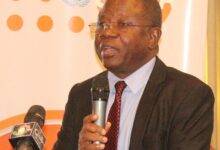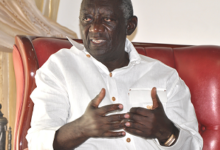
The Board Chairman of the Ghana National Gas Company (GNGC), Mr Kennedy Ohene Agyapong, has reiterated the company’s commitment to harnessing the country’s natural gas for its socio-economic development.
According to him, the global discourse on transition fuels undoubtedly pointed to the fact that natural gas would become key, and all the necessary steps were being taking to ensure that the country was not left out.
“In this era of global discourse of transition fuels, it is undoubtedly that natural gas will become the key energy transition fuel for Ghana. As such, Ghana Gas is resolved and poised to play its leading role in harnessing and diversifying its utilisation for the socio-economic development of the country,” he emphasised.
Mr Agyapong disclosed this at the signing ceremony of the project implementation agreement for the Gas Processing Plant (GPP) Train 2 project in Accra.
The project seeks to construct a train 2 of the Gas Processing Plant with a nominal capacity of 150 million standard cubic feet (MMscfd) expandable to 200 mmscfd to process incremental raw gas volumes from the Greater Jubilee and Ten fields.
The $700 million project is being constructed by the GNGC and its consortium partners comprising the Integrated Logistics Bereau Ghana Limited (Instel), Phoenix Park Gas Processers Limited and Jonmoore International Limited.
Mr Agyapong said the board of GNGC had approved a five-year strategic plan on the theme “embracing the future together; Expanding infrastructure as an integrated Gas Entity” which aimed at among other things, strengthening and enhancing the mandate of Ghana Gas as the sole state agency tasked to build, own and operate the infrastructure required for gathering, processing, transporting and marketing natural gas resources in the country.
He said the GPP Train 2 was a critical project under the plan as it would process the incremental natural gas volumes from the country’s upstream partners.
“The GPP Train 2 is therefore envisaged to be very critical in meeting Ghana’s energy demands and also play a key driver in the government’s industrialisation agenda,” he said.
He noted that the new GPP Train 2 would be sited in the Western Region and to the west of the existing GPP Train 1 with an estimated project cost of $700 million.
Mr Agyapong said the project would comprise a 150 mmscfd of gas per day capacity processing plant expandable to 200 mmscfd, storage facilities, compression package and associated treatment and utility systems.
On his part, the Chief Executive Officer of GNGC, Dr Benjamin Asante, said the project would enable it to become a fully integrated gas services company which would provide reliable supply of gas and gas derivatives in Ghana and West African Sub-region.
It would further fulfill the Company’s vision of supplying gas in a cost-effective and environmentally friendly manner, he said.
The new plant, upon coming on stream, he said, would improve the output of liquids processed from natural gas to 80 per cent, compared to the existing facility, which produced between 40 and 50 per cent of liquids.
Dr Asante added that the plant would help the nation to generate more megawatts of electricity and ultimately resolve the perennial power outrages (dumsor) experienced in Ghana.
The by-products from the processed gas, he explained, could be used to manufacture fertiliser, which would boost the agriculture industry and ultimately reduce the country’s fertiliser import.
Dr Asante signed on behalf of GNGC while Dr Hilton John Mitchell on behalf of the consortium
BY CLIFF EKUFUL







